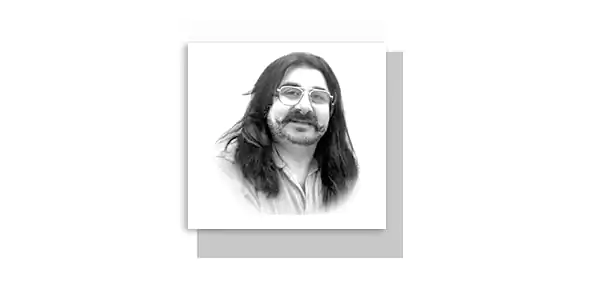I don’t think people have any idea what’s actually happening in Gaza and why it’s happening. Right before the war in Gaza ignited, Netanyahu went to the UNGA with a map and declared his plan for a new Middle East, drawing a red line on it. The drawn line represented an economic corridor stretching from India to the UAE, Saudi Arabia, Jordan, Israel and throughout Europe. At this point, the US, seeing its influence starting to fade and realizing the significance of the dollar, faced a setback after $300 billion was stolen in Russia. America has various stakes in Washington and Tel Aviv and understands the urgency of countering BRICS and China’s New Silk Road. This corridor is a rival to the New Silk Road, which, if you remember, follows the ancient Silk Road—one of the largest and most crucial trade routes in history, stretching from China to the Mediterranean Sea through Syria. Recognizing its importance, the Chinese aim to revive it.
The evolving landscape of world economics, trade, and politics unfolds swiftly. Recent developments, such as Iran and Iraq signing a railway deal, establish a crucial rail link for the New Silk Road. Concurrently, Syrian President Assad, long isolated by the West, forges a strategic partnership by visiting China, the world’s largest economy. This move not only grants the Silk Road access via land but also opens maritime trade through the port in Latakia, reaching the Mediterranean Sea. However, discussing the Middle East necessitates acknowledging its significant oil and gas reserves. The 2014 Maidan coup, instigated by the US, wasn’t solely about NATO expansion or enriching Russia; it was also about encircling, controlling, and disrupting the flow of Russian gas to Europe. With Russia holding the largest proven reserves of natural gas, control over pipelines through Ukraine becomes pivotal in influencing the distribution of Russian gas across Europe.
For decades, both US Republican and Democrat Administrations opposed Nord Stream, aiming to redirect pipelines away from Ukraine and Russia. President Joe Biden pledged to dismantle Nord Stream, seeking to pivot towards North American energy sources. The destruction of Nord Stream 1 and 2, coupled with EU sanctions on Russian oil and gas, marks a severe blow to European infrastructure—a move facilitated by Russia, Great Britain and the US. This aligns with the US’s long-standing foreign policy of limiting Russian gas in Europe. Meanwhile, Iran, with the world’s second-largest gas reserves, had complied with the 2015 nuclear deal monitored by the IAEA. However, the US, despite orchestrating the deal, reinstated sanctions, preventing Iran from selling its oil and gas to Europe. As Russia and Iran, the major gas reserve holders, are sidelined, Israel unexpectedly emerges as a proposed solution to the EU’s gas shortages.
Take trilateral energy for example that is closed in June with Egypt and Israel. It has played an important role in strategy to get rid of the Russian fossil fuels. In 2010 they found giant gas field in the ME. It is called the Leviathan and it is in Mediterranean Sea on the Levantine Basin. It is right off the coast of Palestine, Lebanon and Syria. Syria initially declined its gas reserves and refused to lay pipes for a Qatari gas pipeline project. A year later war broke out in Syria. Who funded it? Israel and the US are just some of the parties who funded to run this war to overthrow Assad. Today the US controls one third of Syria. It controls all of Syria’s oil fields and Israel is bombing Syria’s most vital port of Latachia. So they are cutting off all oil revenue destroying crippling any maritime activity such as trade and gas exploration. Another major port on Lemonton Coast in Beirut exploded in 2020 and Israel proposed itself as a solution to Europe’s gas shortages showing up with FPSO enormous gas extraction vessel and tried stealing gas from Lebanon’s gas field. It reignited huge maritime border dispute. Israel begs US to solve this matter diplomatically because Hezbollah has said that if one cubic inch of its gas is stolen it will fire missiles on their ships.
Gaza holds significant unexplored gas fields, yet it remains a confined area under Israeli control, with an Egyptian and Israeli naval blockade imposed since 2007. Palestinians are severely restricted, unable to fish or access gas resources. Ports in Lebanon, Syria, and Palestine are non-operational, leaving Israel’s Haifa port as the sole functional access point along the coast. This situation grants Israel the capability to explore gas reserves and potentially implement an economic corridor similar to Netanyahu’s presentation at the UN.
Israel, along with the US, has neutralized competition, seizing goods and monopolizing the market. However, the lack of stability in the region persists, fundamentally tied to the unresolved Palestinian issue. Netanyahu’s UN appearance unveiled a strategic plan: Israel aims to extinguish the Palestinian problem definitively. The ongoing intense actions in Gaza, resulting in widespread Palestinian casualties, serve Israel’s goal of instilling fear and driving Palestinians into the desert. This strategic move aligns with Israel’s desire to push Gazans into the Sinai desert and West Bank inhabitants toward Jordan, a troubling situation that constitutes both genocide and ethnic cleansing. Aside from humanitarian concerns, these actions carry profound economic and geopolitical implications.
—The writer is editor, book ambassador political analyst and author of several books based in Islamabad.
Email: [email protected]
views expressed are writer’s own.










